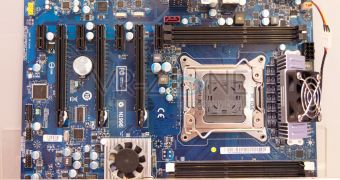Scheduled to take place between September 13 and 15 in San Franciso, the 2011 Autumn edition of the Intel Developer Forum will witness the introduction of a series of MSI LGA 2011 motherboards based on the Intel X79 chipset, announced the Taiwanese company in a press release.
The announcement was scarce in details, so we don't know what motherboards the company will actually demo and what is the actual development state of these models.
MSI has already showcased a few LGA 2011 boards based on the Intel X79 chipset during Computex 2011, but these were nothing more than very early prototypes that were meant just to give us an idea about how the final products may look like.
Similarly to the P67 and the P55 released before it, the X79 features a PCH (platform controller hub) design as most of the tasks that were handled by the X58 chipset previously, such as PCI Express connectivity, were integrated inside the Sandy Bridge-E CPUs.
However, the X79 packs an impressive array of features compared with its predecessors as it now supports no less than 10 SATA 6Gbps, while the PCH is linked to the CPU via a DMI 2.0 interface as well as through an additional PCI-Express 2.0 x4 link.
This can be enabled or disabled by the user in the motherboard's EFI BIOS and should bring a noticeable performance increase in systems that pack high-performance storage systems.
In addition, the X79 PCH also features an Intel Rapid Storage enterprise controller that enables RAID 0/1/5/10 support and eight of the available SATA interfaces can be configured as SAS ports by motherboard manufacturers.
The rest of the specs list includes an 8-lane PCI-Express 2.0 hub, which can be used to drive the x1 and x4 slots, as well as 14 USB 2.0 ports.
Sadly, the PCH doesn't feature native USB 3.0 or Thunderbolt support, which is an important omission considering its target market.
Outside of Intel X79-powered motherboards, MSI's IDF booth will also include a series of PCI Express Gen 3 mainboards and the so called MSI GUS (Graphics Upgrade System) docking station.

 14 DAY TRIAL //
14 DAY TRIAL //